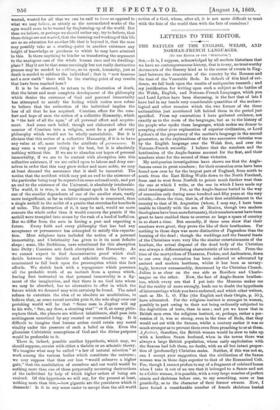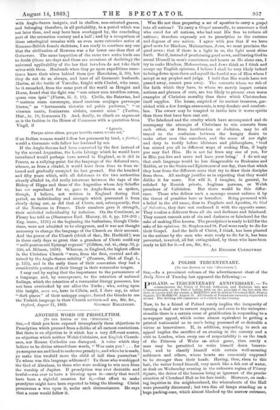LETTERS TO THE EDITOR.
THE BATTLES OF THE ENGLISH, WELSH, AND NORMAN-FRENCH LANGUAGES.
[To THE EDITOR OF THE "SPECTATOR.'] SIR,—It is, I suppose, acknowledged by all modern historians that we have no contemporaneous history, that is to say, no trustworthy documents of the literary kind as to the course of events in Eng- land between the evacuation of the country by the Romans and the time of the Venerable Bede. In default of this kind of evi- dence, we fall back upon the results of antiquarian research ; and my justification for writing upon such a subject as the battles of the Welsh, English, and Norman-French Languages, which you. and Lord Lytton have been discussing, is the fact that of late 1 have had in my hands very considerable quantities of the archaeo- logical and other remains which the two former of the three nationalities just mentioned left behind them in the period just• specified. From my excavations I have gathered evidence, not exactly as to the roots of the languages, but as to the history of the people who spoke these languages, which makes me demur to accepting either your explanation of superior civilization, or Lord Lytton's of the prepotency of the mother's language in the second, generation, as the explanations of the two successive victories won by the English language over the Welsh first, and over the Norman-French secondly. I believe that the numbers and the heathenism of the Anglo-Saxons account for the first, and their numbers alone for the second of these victories.
My antiquarian investigations have shown me that the Anglo- Saxons came in great numbers ; for their cremation urns have been found now over by far the largest part of England, from north to south from the East Riding Wolds down to the North Foreland, from east to west from Norfolk to points much further west than the one at which I write, or the one in which I have made my chief investigations. For, as the Anglo-Saxons buried in the way of cremation only during some hundred and fifty years at the very outside,—from the time, that is, of their first establishment in the country to that of St. Augustine (whom, I may say, I have been unable to identify with the son of Monica, though two modern, theologians have been more fortunate), their numbers must have been great to have enabled them to overrun so large a space of country in so short a time. But secondly, if these urns show that their numbers were great, they prove the like of their heathenism. For nothing in those days was more distinctive of Pagandom than the burning of the dead ; though the weddings and the funeral feasts of the Christians were very like the similar entertainments of the heathen, the actual disposal of the dead body of the Christian. was always a differentiating characteristic of his creed. From the- time of the martyrdom of Tharacus, Probus, and Andronicus, down to our own day, cremation has been enforced or advocated by ancient and modern heathens, whilst it has been as unvary- ingly, however unreasonably, denounced by the Christian Church_ Julian is as clear on the one side as Boniface and Charle- magne on the other. Now, the fact of Anglo-Saxon heathen-. ism, which every urn that I put into the Museum makes me feel the reality of more strongly, leads me to doubt the hypothesis of intermarriage which you have endorsed, and which other writers, such as Mr. L. 0. Pike (the English and their Origin, p. 50.), have advocated. For the religions instinct is stronger in women, possibly in part owing to their not being ordinarily subjected to. the deglutition of tests, than in men ; and yet we know that in British men even the religious instinct, or, perhaps, rather a per- version of it, was so strong, even in the time of Bede, that they would not eat with the Saxons, whilst a century earlier it was so. much stronger as to prevent them even from preaching to or at them- A fortiori, therefore, the British woman would be slow to take up with a heathen Saxon husband, when in the towns there was always a large British population, whose early capitulation with, the Saxons had left them, no doubt, with an all but intact propor- tion of (professedly) Christian males. Neither, if this was not so, can I accept your suggestion that the civilization of the Saxon. woman was in those days superior to that of the Romanized Celt. For, though I cannot profess to say of a fragment of calcined bones when I take it out of an urn that it belonged to a Saxon and not to a Celtic woman, it is possible, with a very large number of perfect crania and skeletons before one, to say something, more or leas guardedly, as to the character of their former owners. Now, I have found a considerable number of female skeletons buried with Anglo-Saxon insignia, and in shallow, non-oriented graves, and belonging .therefore, in all probability, to a period which was not later than, and may have been overlapped by, the concluding part of the cremation century and a half ; and by a comparison of these osteological remains with an even more extensive series of Romano-British female skeletons, I am ready to convince any one that the civilization of Rowena was a far lower one than that of Guinevere. The same inspection of the same two series leads one to doubt (these are days and these are occasions of doubting) the universal applicability of the law that invaders do not take their wives with them. Husbands when they go upon expeditions some- times leave their wives behind them (see Herodotus, ii. 30), but they do not do so always, and least of all Germanic husbands. Marius, at the battle of Vercellm, fought with Cimbri, who came, be it remarked, from the same part of the world as Hengist and Horsa, found that the fight was " non minor cum uxoribus eorum, quam cum ipsis" (Florus, iii. 3, 16). Civilis, the Batavian, had " matrem suam sororesque, simul omnium conjuges parvosque liberos," as " hortamenta victoria; vel pulsis pudorem," " ut virorum cantu, feminarum ulttlatu, sonaret sties " (Tacitus, Hist., iv. 18, Germania 7). And, finally, to clinch an argument as is the fashion in the House of Commons with a quotation from Virgil, if
" Lycoris
Perque fives alium, perque herrida castra secuta est,"
if an Italian woman would follow her paramour by land, a fortiori, would a Germanic wife follow her husband by sea.
If the Anglo-Saxons had been converted by the first instead of by the second Augustine, the Latin Liturgy which he would have introduced would perhaps have served in England, as it did in France, as a rallying-point for the language of the defeated race, whence, as from a citadel, it would have from time to time re- issued and gradually occupied its lost ground. But the hundred and fifty years which, with all deference to the two authorities already alluded to, did really intervene between the days of the Bishop of Hippo and those of the Augustine whom Ary Scheffer has not reproduced for us, gave to Anglo-Saxon as spoken, though, I believe, not written in England during that period, an individuality and strength which prevented it from slowly dying out, as did that of Clovis, and, subsequently, that of the Normans in France. Their numbers gave it strength, their misbelief individuality by isolation. On the Continent, as Fleury has told us (Discourses Eccl. History, iii. 8, pp. 138-203 ; Eng. trans., 1721) at the beginning the barbarians, though Chris- tians, were not admitted to be clergymen, and it was not thought necessary to change the language of the Church on their account. And the power of the Church (think of that, Mr. Hadfield!) was in those early days so great that a grandson of Clovis could say " nulli penitus nisi Episcopi regnant " (Gibbon, vol. vi., chap. 38, p. 350, ed. Milman, 1838). Whereas, in England, the highest offices in the Christian Church " were, from the first, coveted and ob- tained by the Anglo-Saxon nobility " (Pearson, Hist. of Engl. i., p. 133), and in the early times of their conversion they had a considerable portion of their liturgy in their vernacular tongue.
I may end by saying that the importance to the permanence of a language, and, by consequence, to the retention of national feelings, which the retention of a vernacular liturgy possesses, has not been overlooked by our allies the Turks ; who, acting upon this insight, more silo, have in Cilicia, and, I dare say, in other "dark places" of their unhappy empire, forced the Greeks to use the Turkish language in their Church services.—I am, Sir, &c.,































 Previous page
Previous page